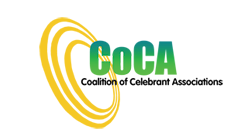Workforce Development - Vocational Education & Training Report October 2016
Presented to the Marriage Law & Celebrant Section Thursday 27th October 2016
Rona Goold BSc (Gen Sc) Dip Ed CMC
Celebrancy Sector Representative
Industry Reference Committee for Client Services
Purpose:
To provide an update on the status of celebrancy training through the VET system and to make a recommendation for the Department to consider in order to ensure that applicants for registration as a celebrant have a high standard of competence.
Background:
Attachment A provides an overview of the current arrangements within the VET system in relation to responsibility for the development and review of celebrancy qualifications. It also highlights some errors that have been identified in the published documents and the process for reporting errors.
Ensuring that graduates of the Certificate IV course have the skills required as a celebrant.
As noted at the last meeting, the role of the VET system is to ensure celebrant graduates have developed “the skills and qualifications needed to allow them to participate effectively in the labour market.’
To this end, and also to meet educational principles for skills training, the role for training is “celebrant“, not “marriage celebrant”.
Celebrancy training has specific limitations because:
- Graduates must be able to deliver once-in-a-life events each time i.e. clients cannot be called back in for celebrants’ mistakes to be corrected, as may be the case with some other professions.
- Trainees do not have hundreds of hours of placement or mentoring/ supervision as is possible in other qualifications.
This issue will be re-visited in 2019-2020 when the effectiveness of the new Certificate IV qualification is assessed.
In the meantime, as regards workforce development, CoCA noted last meeting the concern that the oversupply of marriage celebrants means civil celebrants can no longer rely on marriage work as a stable core of their work, and many are doing insufficient numbers of marriages to maintain and/or improve their skills1. This lack of practice is compounded if celebrants are not fully competent when they graduate from their training.
Reducing the impact of inconsistent training on the MLCS and the Cost Recovery program
Commonwealth marriage celebrants fund the Marriage Law and Celebrant Section (MLCS) Hotline, which had over 30,000 contacts in 2014-2015.
Therefore, taking steps to ensure graduates of the Certificate IV in Celebrancy are competently trained professionals in the Marriage Electives by every Registered Training Organisation should reduce the volume of contacts the Marriage Law and Celebrant Section take from Commonwealth celebrants.
One way of encouraging consistent high standards from RTOs would be to introduce mandated assessments for the Marriage Elective Competency Units.
Once implemented, the MLCS would only accept applications for registration from graduates of RTOS that use the MLCS Mandated Assessment Tools. Together with the individual assessment of applicants for registration which the MLCS currently undertakes, this approach would ensure higher standards of competency.
CoCA would be pleased to work with the MLCS and with RTOs to develop mandated assessment tools to establish a process for their development and implementation.
Recommendation:
That the MLCS consider the issues raised in this paper and explore the possibly of developing Mandated Assessments for the Marriage Electives to encourage consistent high standards of competency from applicants for registration as marriage celebrants.
Note:
- The role of a Regulator in the VET system is to ensure that the qualification addresses the needs of their specific legislation, but not the level of qualification. The level of the qualification is to be determined by the industry/ profession and its relation to the Australian Qualification Framework.
For example a regulator responsible for mandatory reporting of child abuse is responsible only to ensure their training qualification covers that aspect in adequate depth and scope by the regulator.
The Regulatory Impact Framework can be address by a variety of strategies not simply by the level of the qualification overall. - 54.69% of Commonwealth marriage celebrants in the 2015 CoCA Survey reported performing 9 or fewer weddings per annum.
Attachment A
As most are aware the VET system is undergoing major change. The skills council now responsible for community services and health client services, where the training of celebrants is placed, is Skills IQ Ltd.
Skills IQ Ltd. looks after 17 Industry Reference Committees (IRCs) representing some 90 diverse service-related and ‘people-facing’ industry sectors. The IRCs are collectively responsible for oversighting the development and review of training packages serving the skills needs of almost 50 per cent of the Australian workforce.
SkillsIQ facilitates and supports Industry Reference Committees to advise the Australian Government via the Australian Industry and Skills Committee on skills training needs for approximately 90 diverse service related industries.
Skills IQ has established an Industry Reference Committee for Client Services which covers in addition to Celebrancy, Career/Employment Consultants (Career development, financial counseling, Employment services) Case Managers, Child Protection Workers, Counsellors, Dispute Resolution Practitioners (Family dispute resolution).
Under the new arrangements, all VET qualifications must be reviewed every four years.
One of its first tasks was to advise the government on the planning needs for qualification development and review. As the celebrancy qualification was only recently reviewed, the IRC advised the celebrancy qualification to be reviewed in 2019-2020.
ASQA is the body responsible for ensuring that VET qualifications are being delivered as set by the Competency units and Assessment Criteria, but play no role determining or reviewing what those are. Therefore enquiries about competency units and assessment criteria should be directed to SkillsIQ.
CoCA has noted some errors in the documents loaded on training.gov.au.
Not all units have been checked as yet, but two important ones to note are:
- In the qualification outline, the Celebrancy specific elective units contain reference to “CHCCDE005 Develop and support relevant community resources”. This is not a Celebrancy specific elective and should be included under Other Electives.
- In unit CHCCEL005 Establish and maintain marriage celebrancy practice the Knowledge Evidence has omitted reference to the Marriage Act in at least five places.
- The Subject Matter Expert Group assessment suggestions were to be placed in Companion Volumes. As these appear to be omitted, SkillsIQ advised CoCA to make these available to RTOs. We have done this via the CoCA website.
If other errors are identified, then please direct these to the SkillsIQ.


